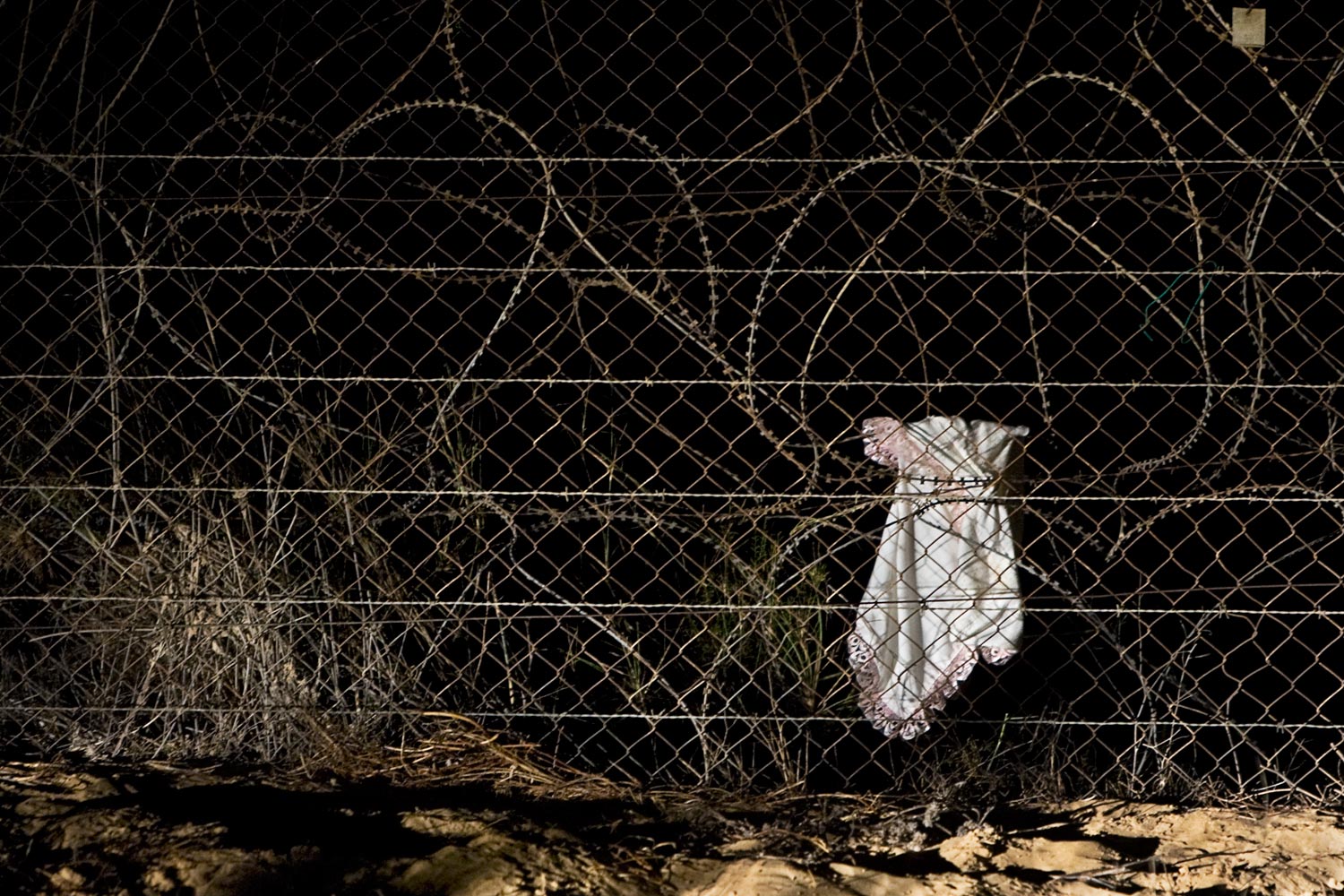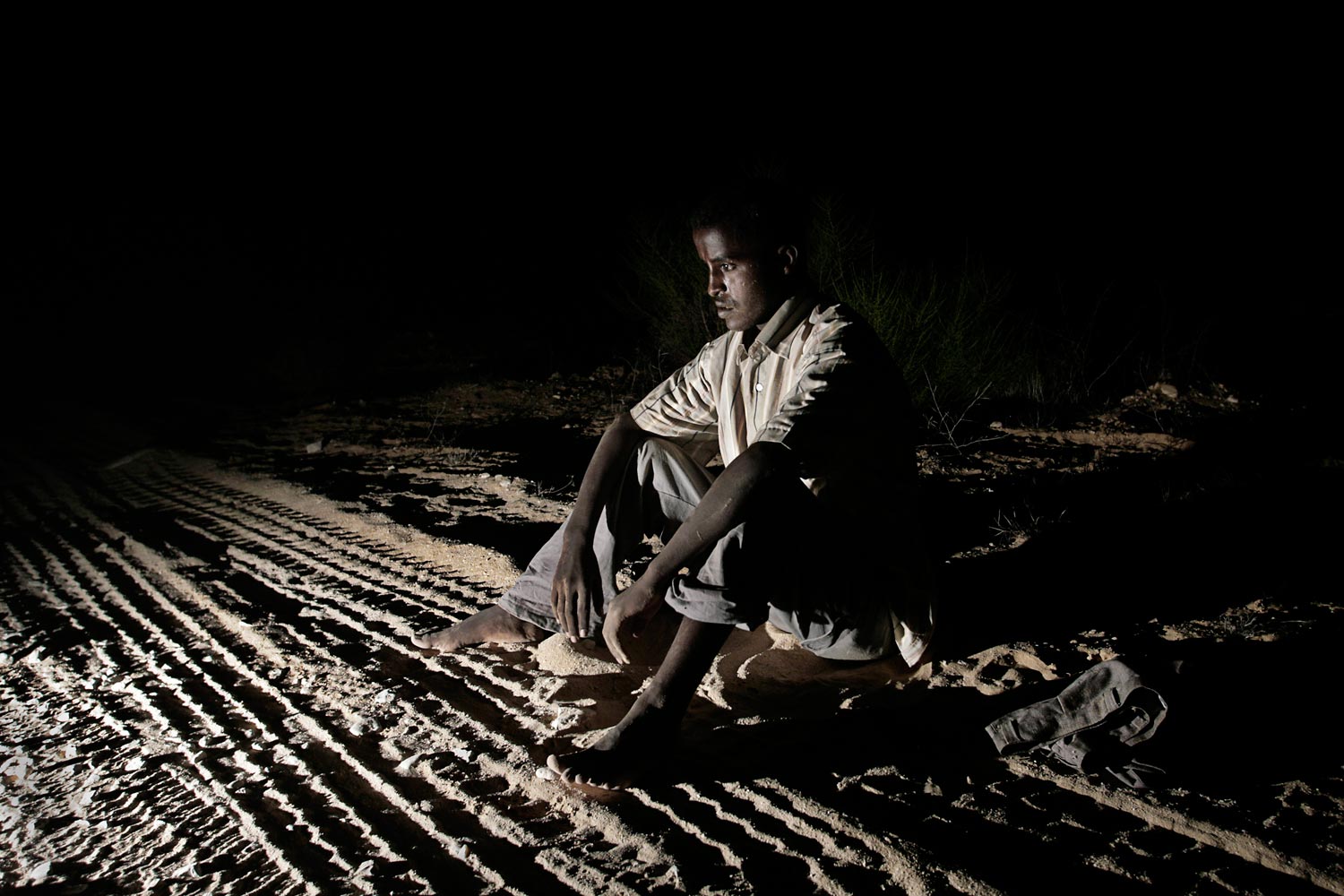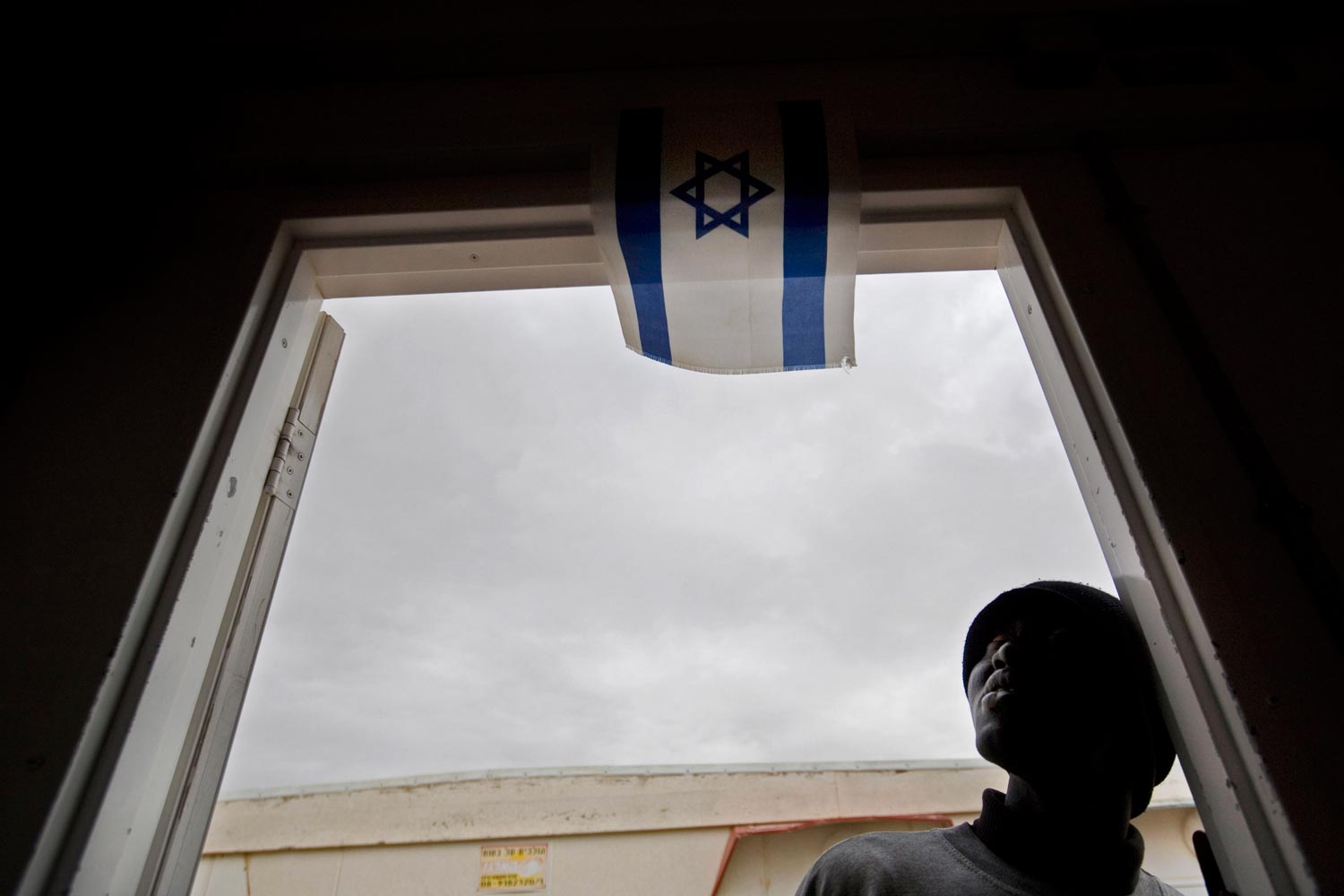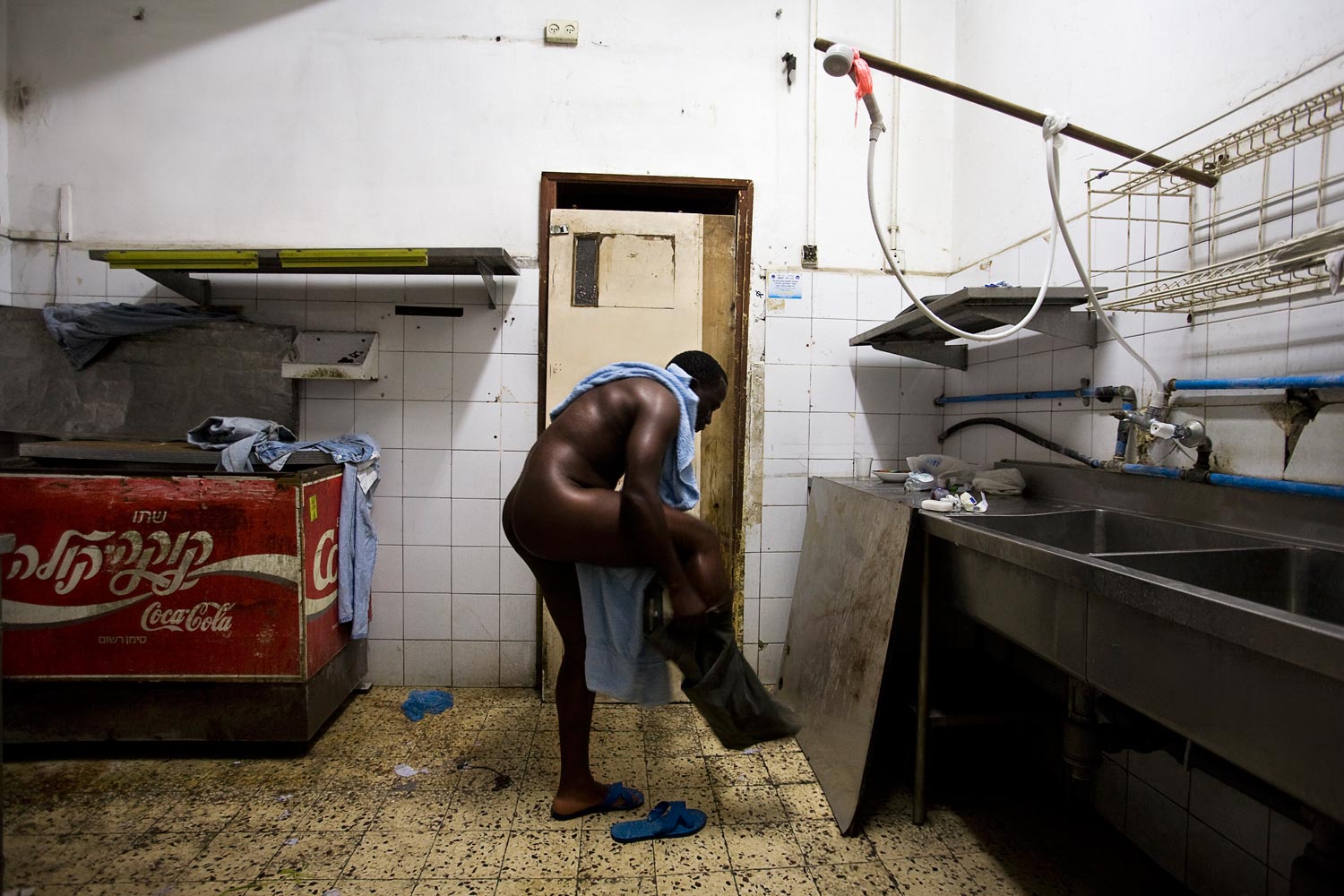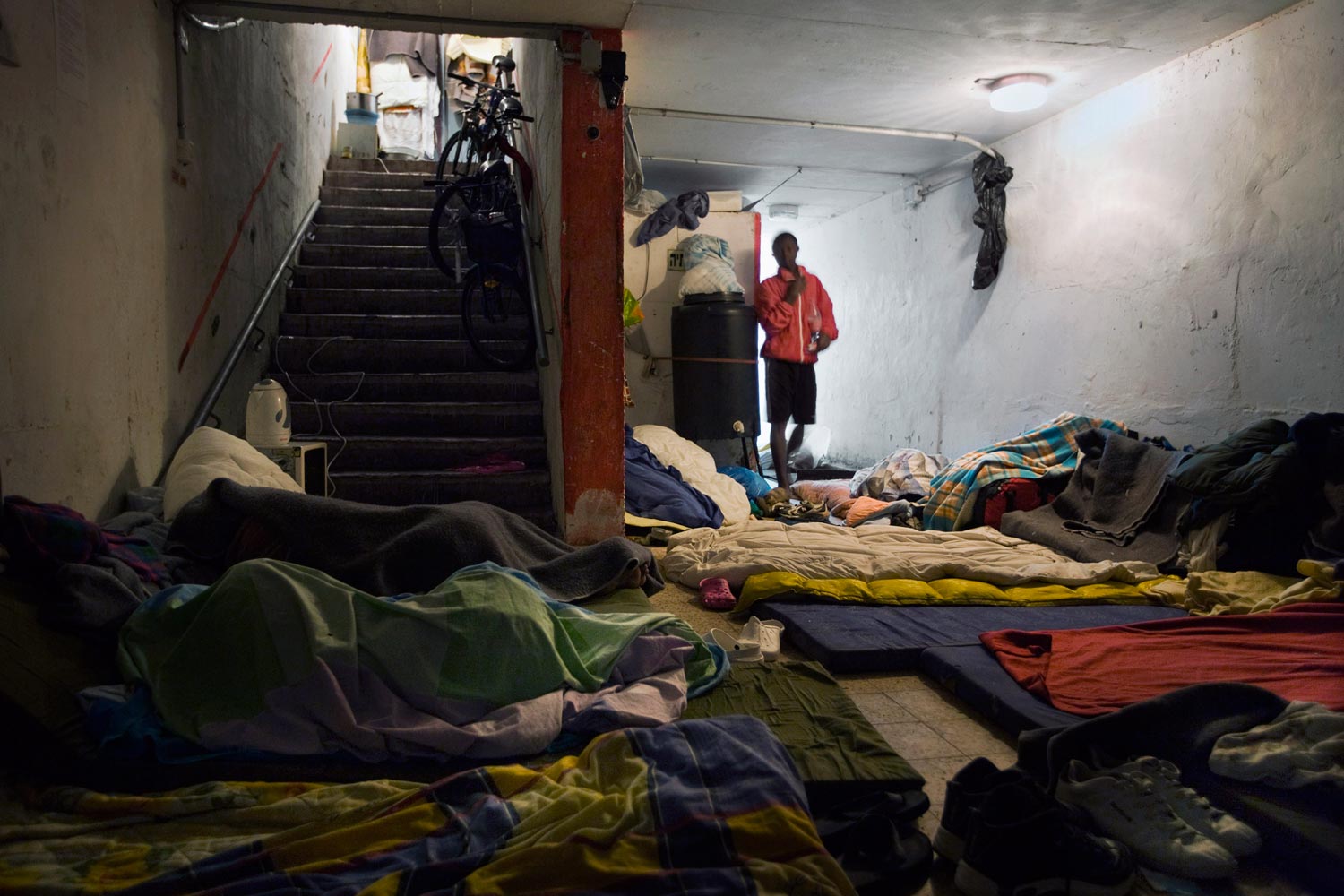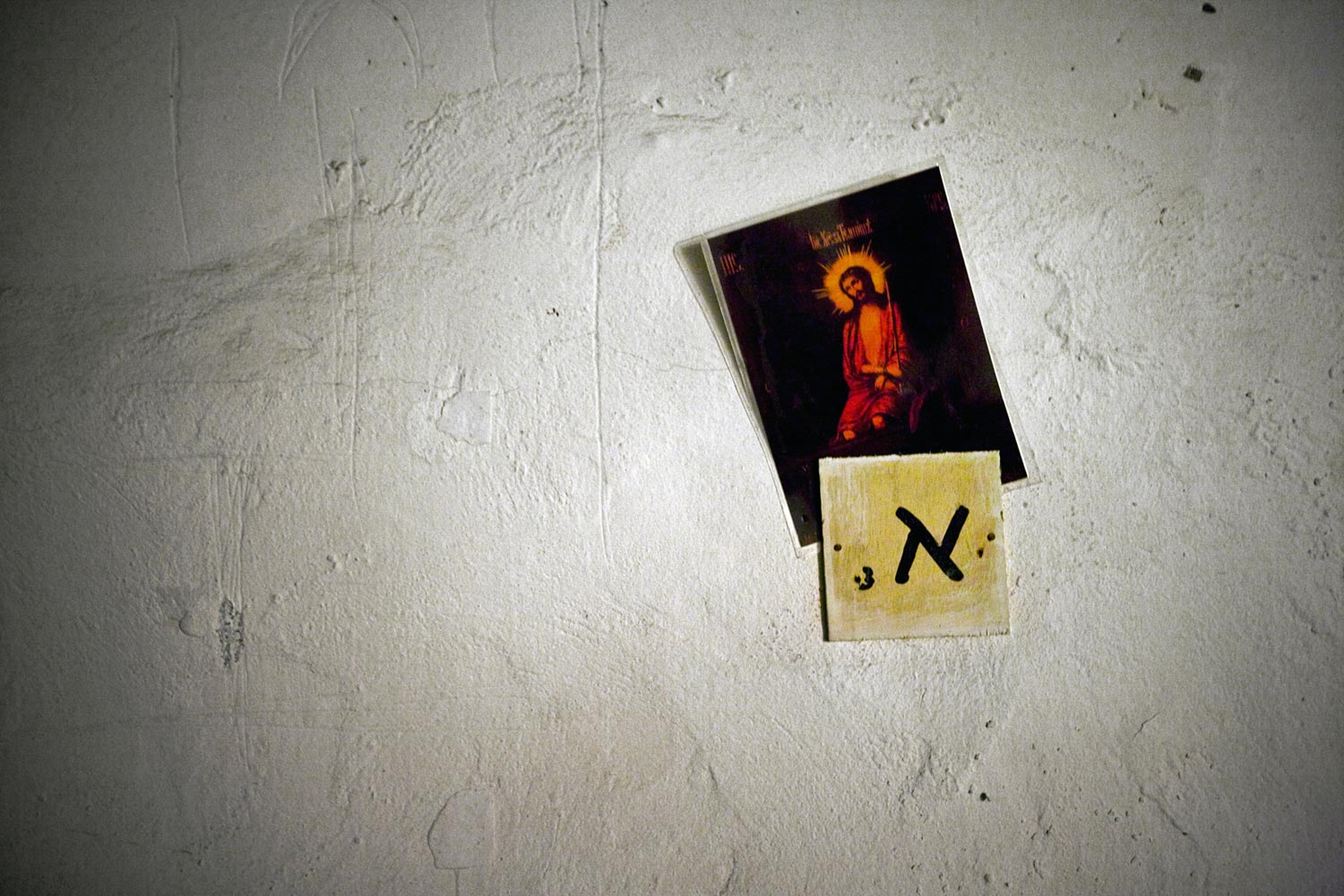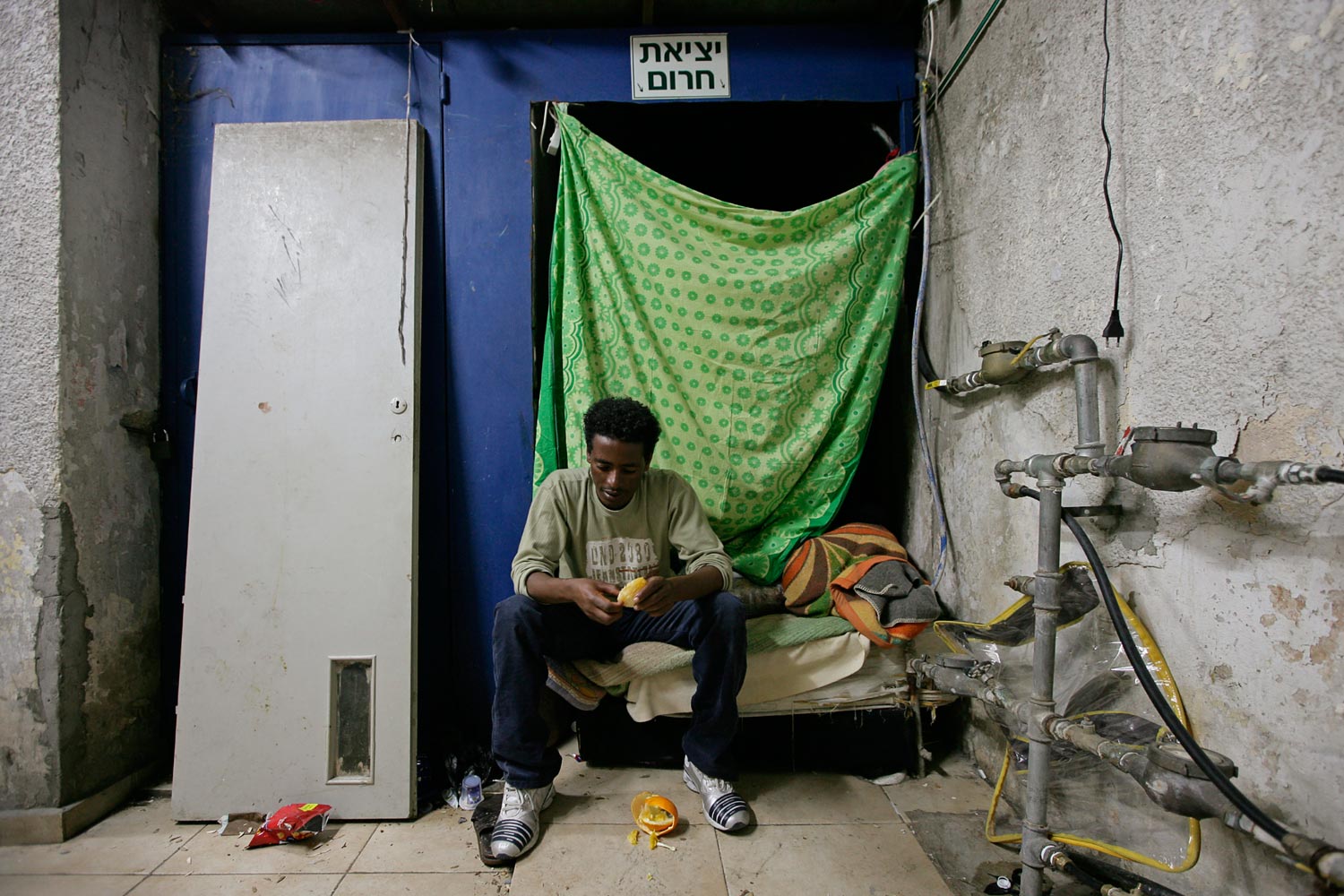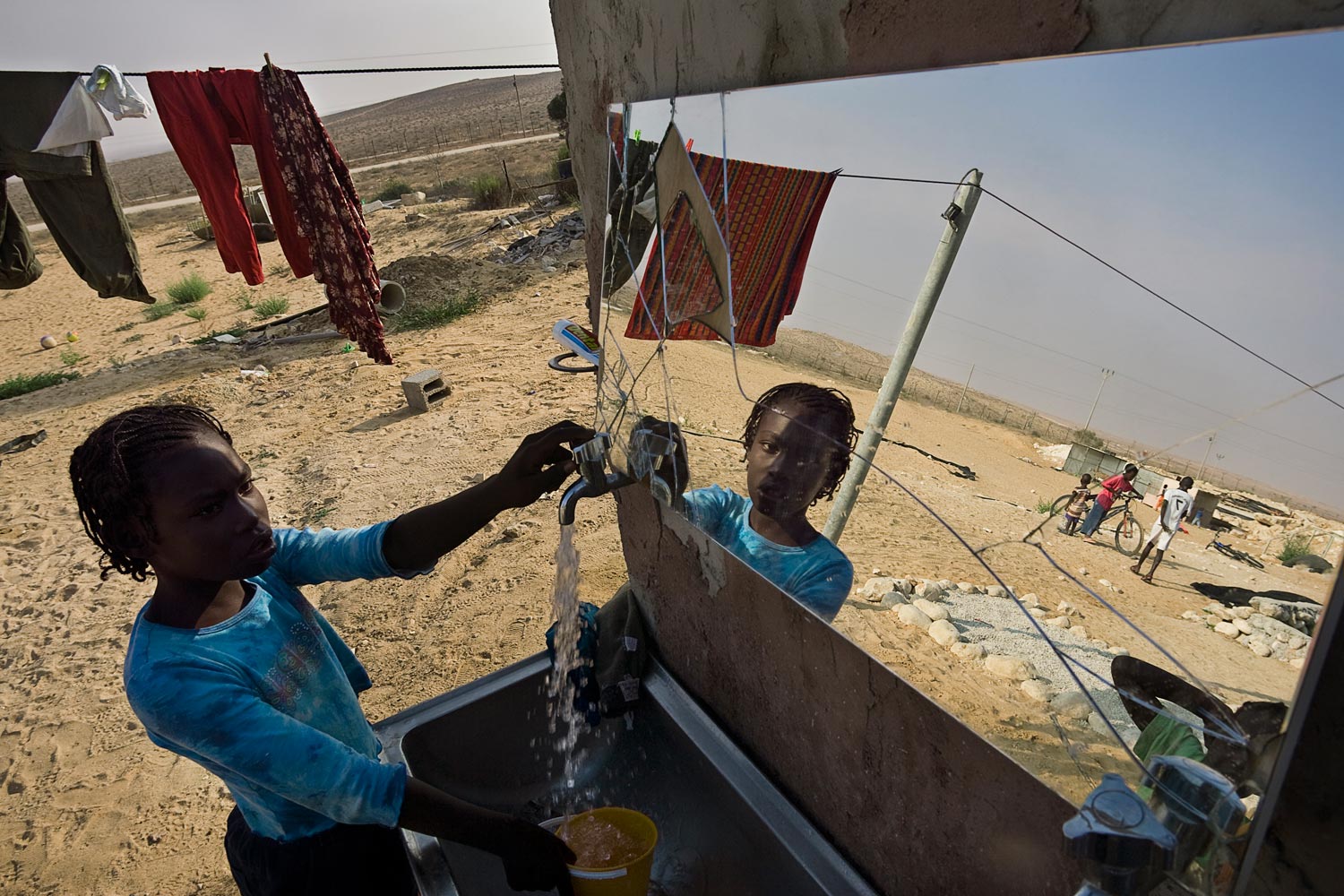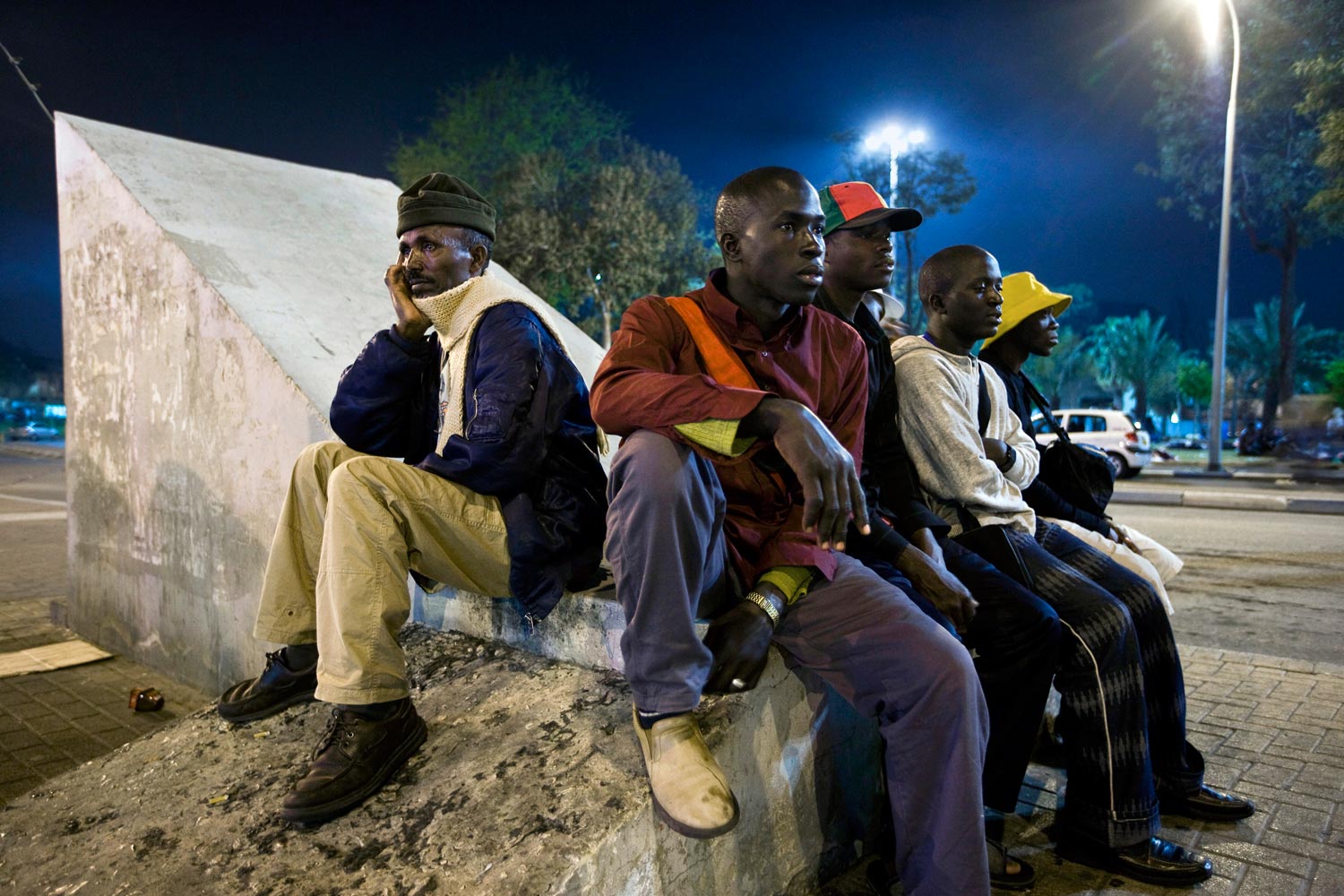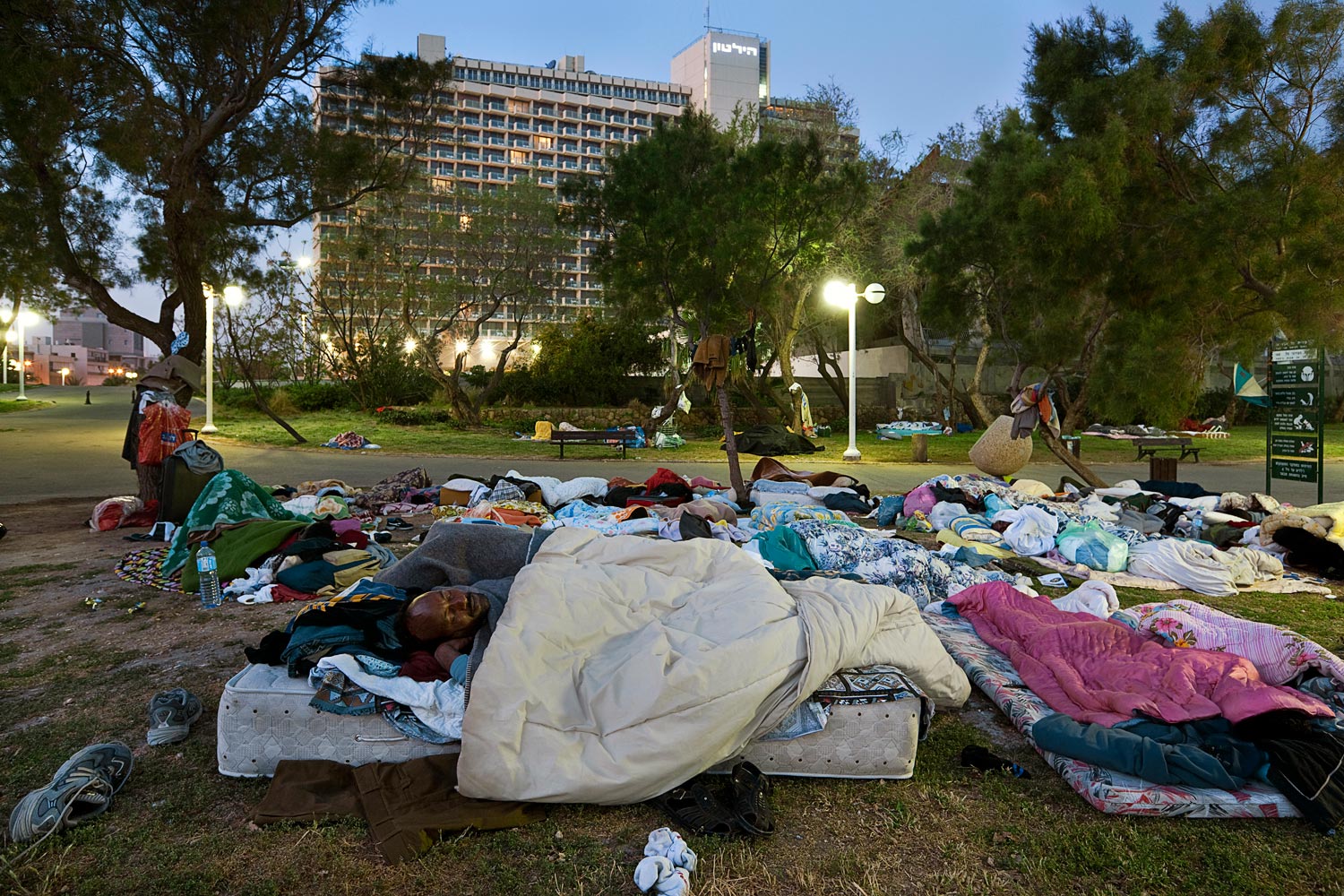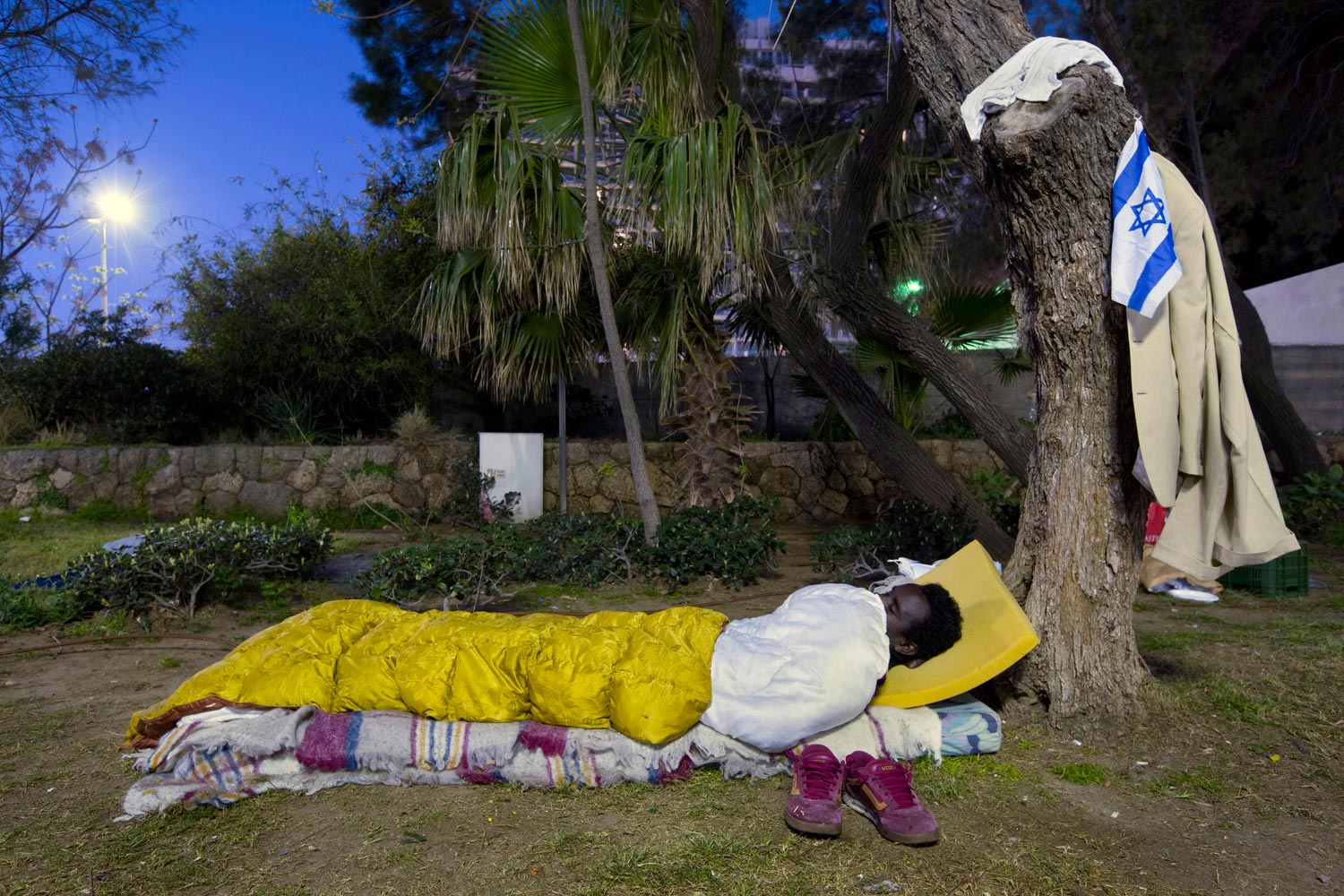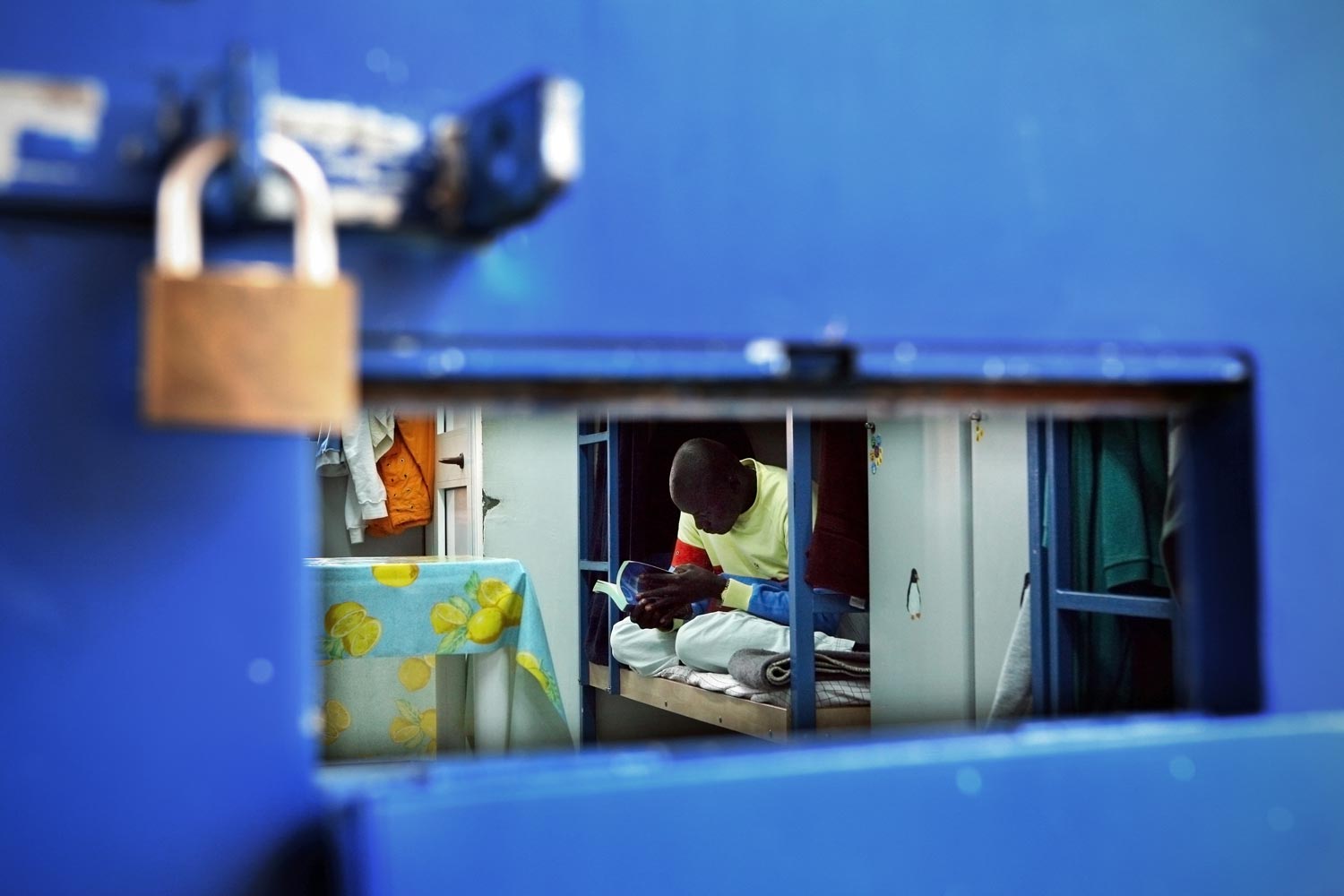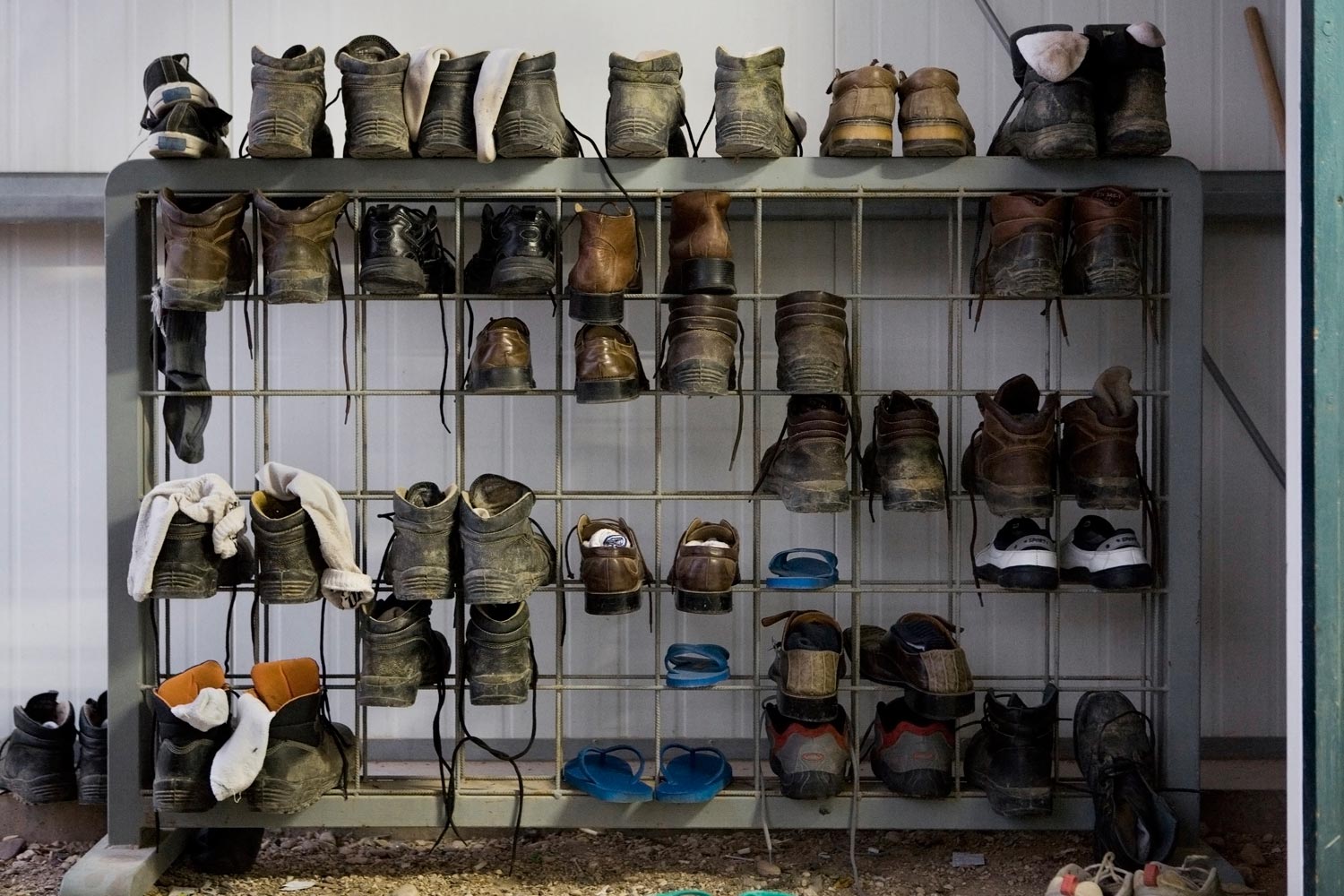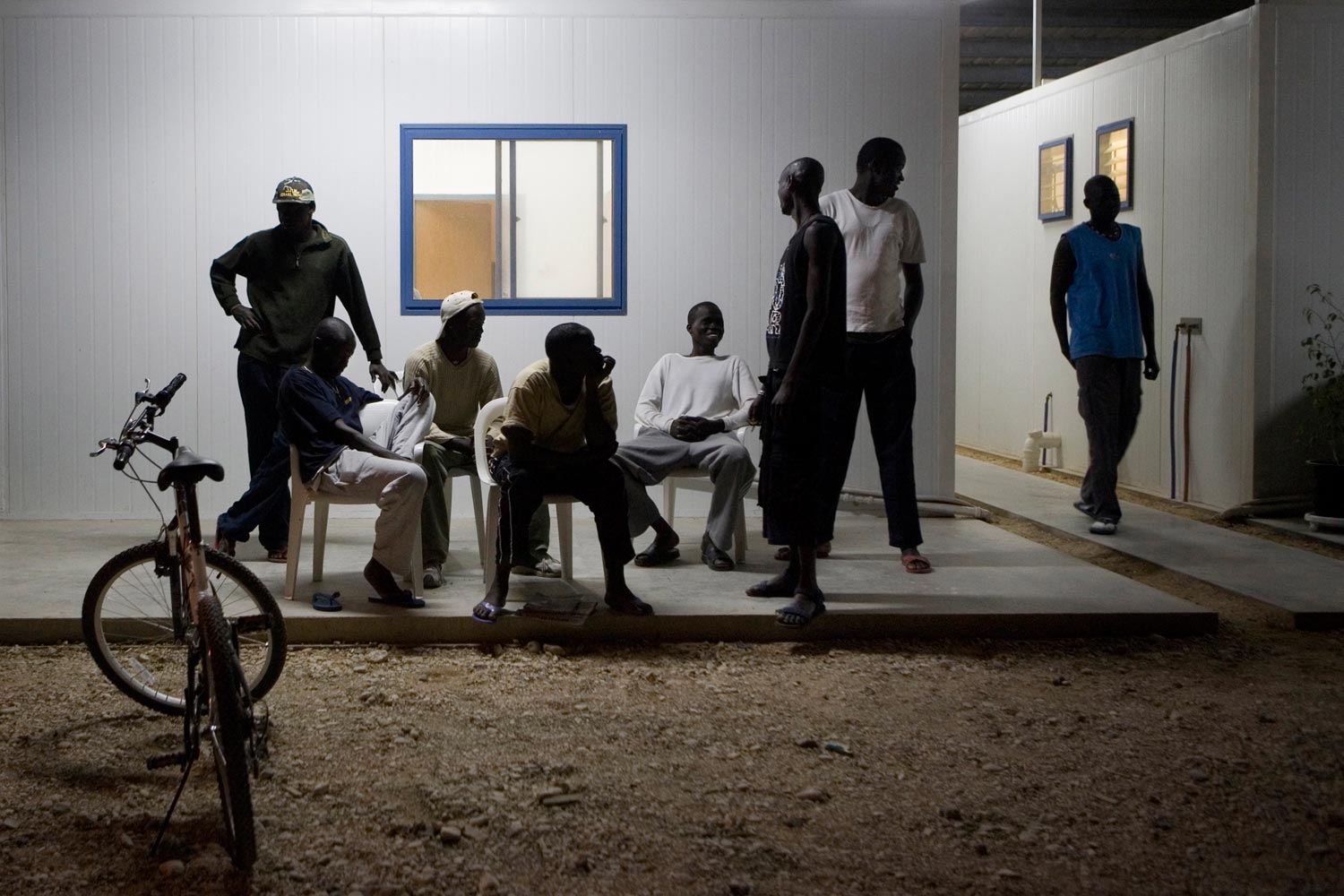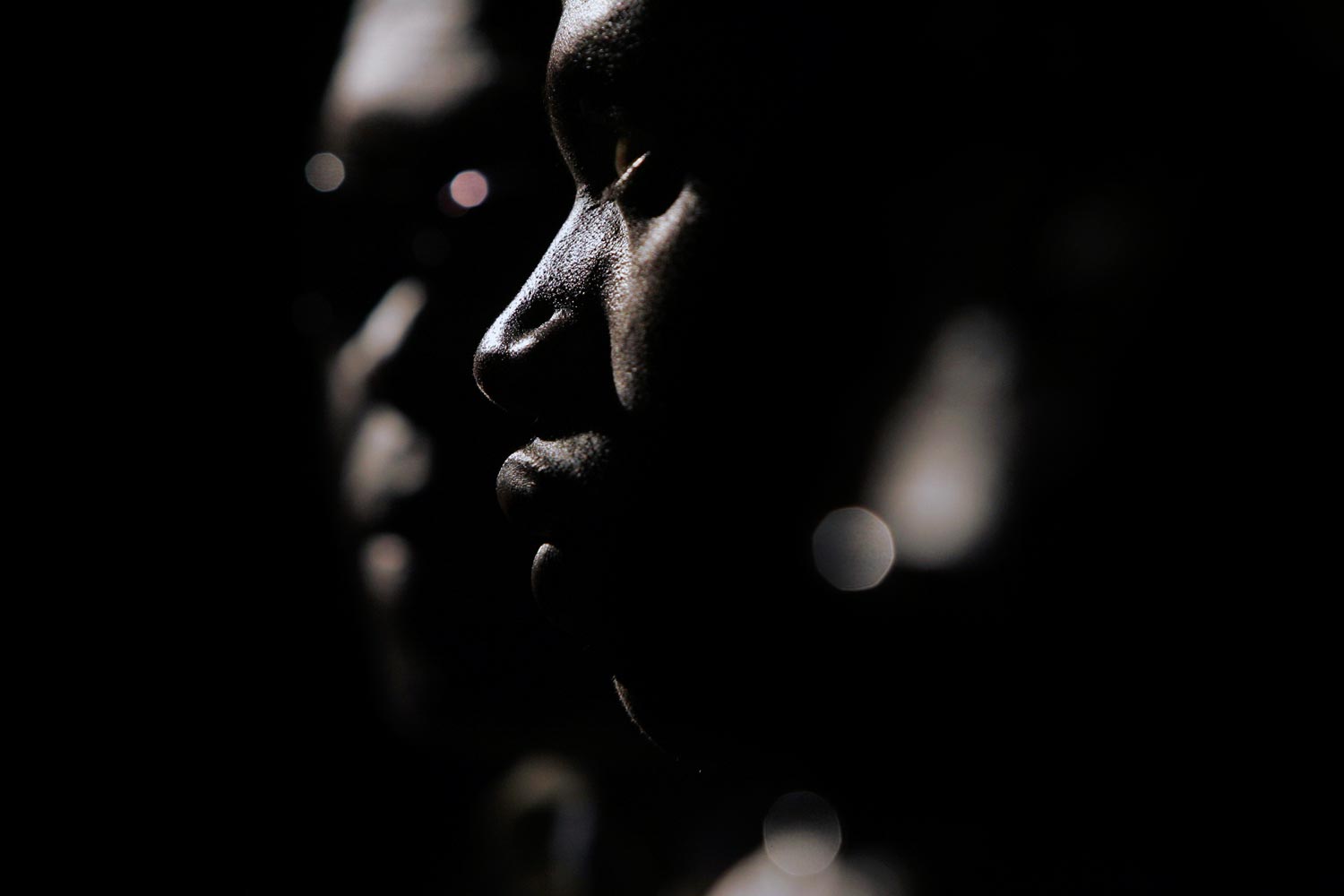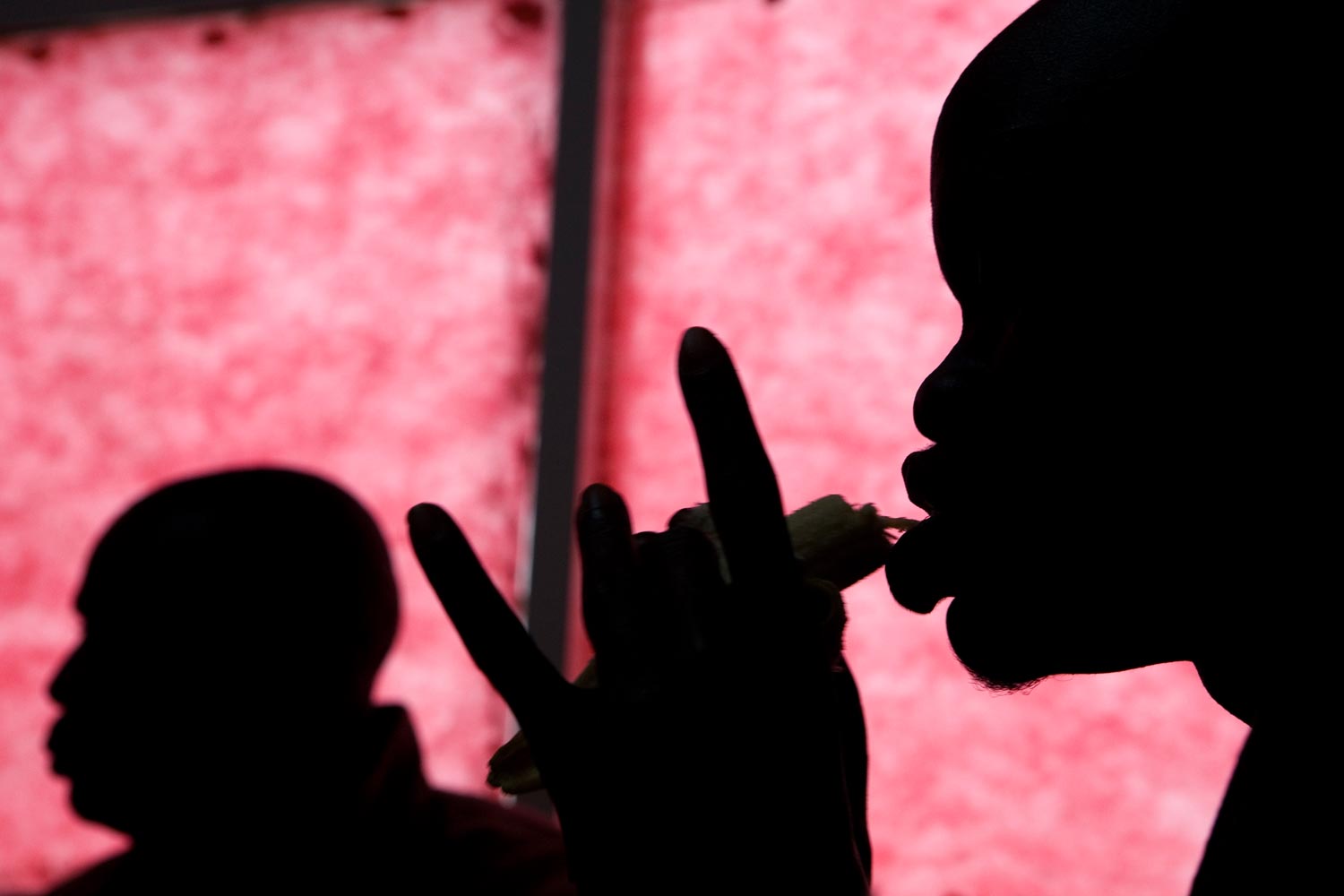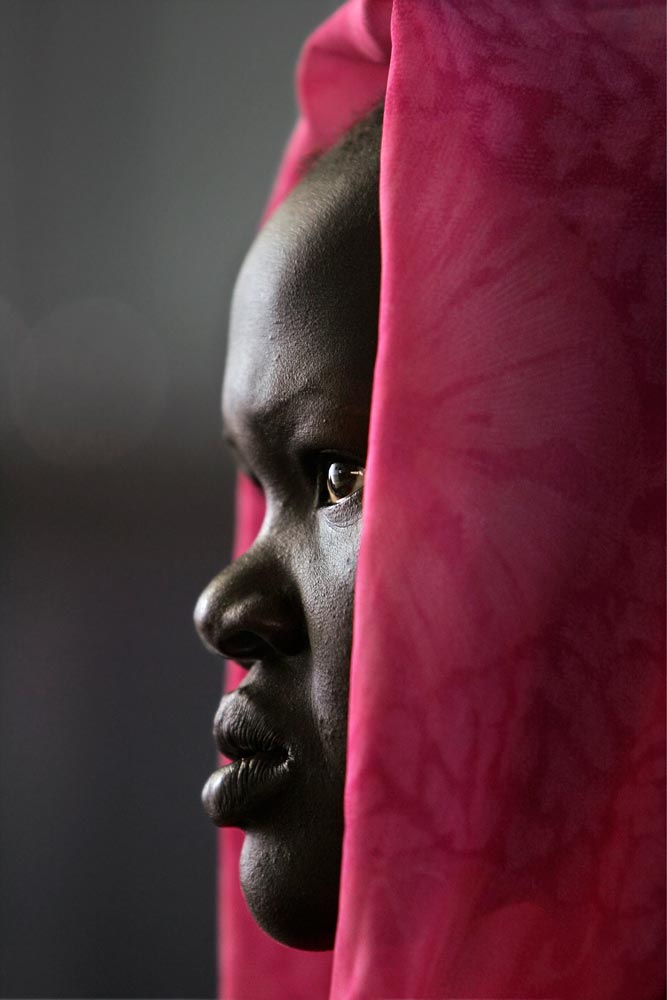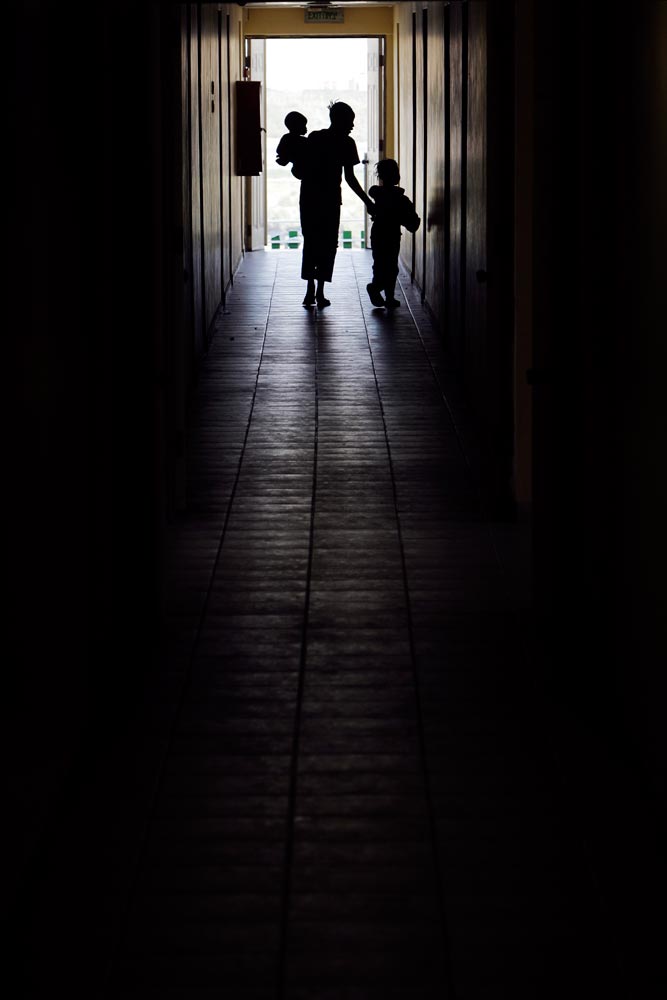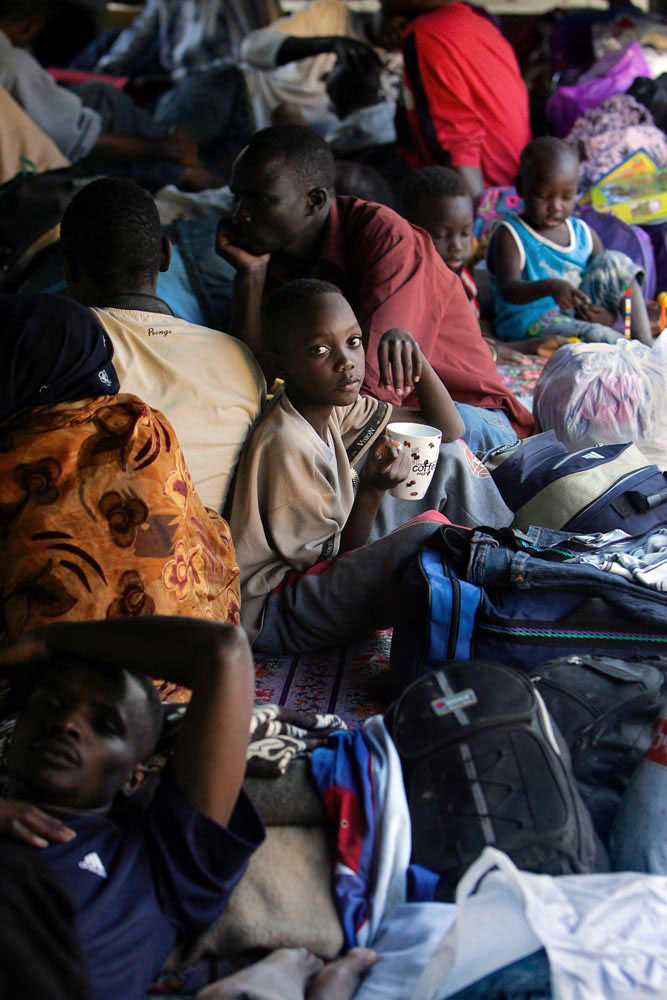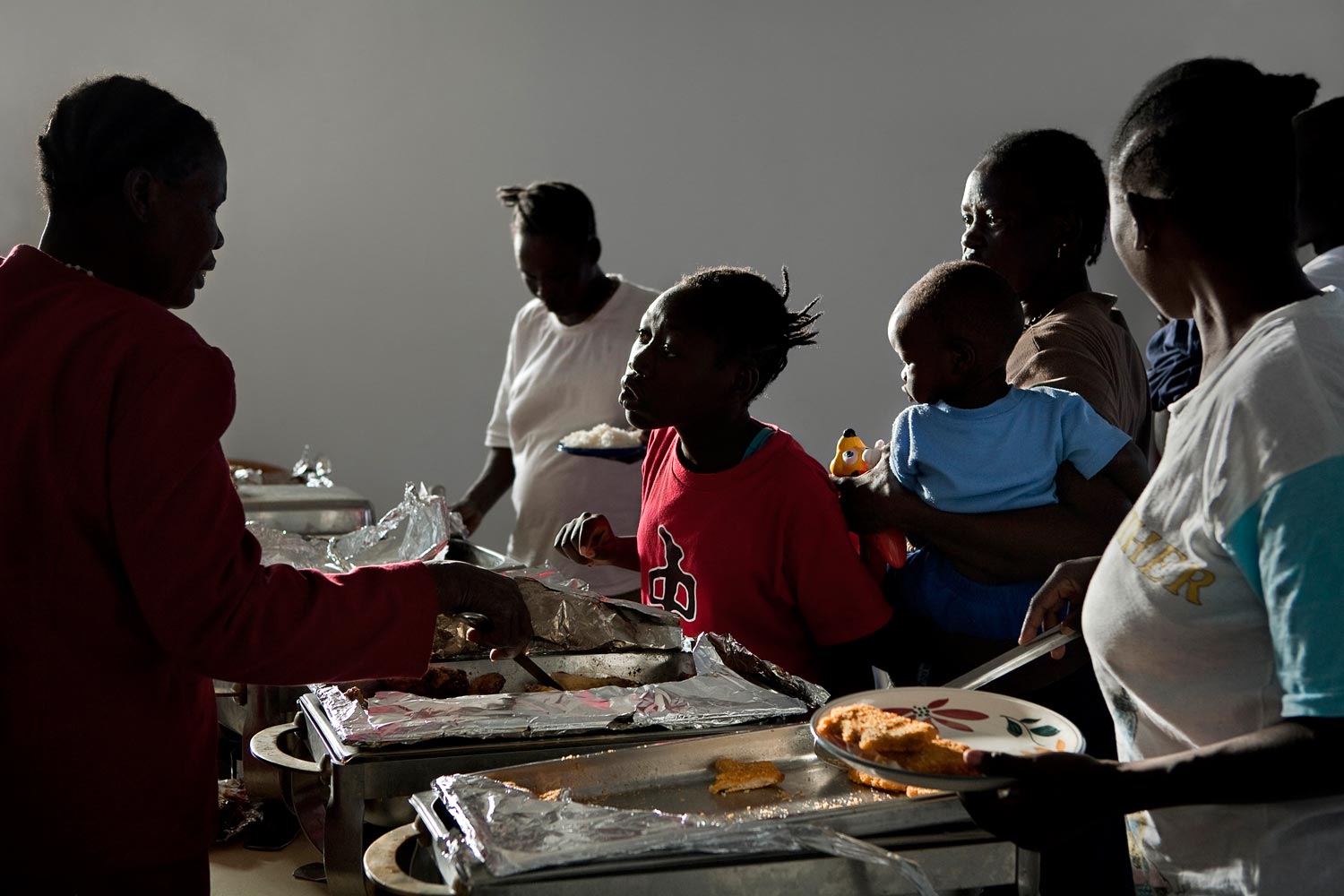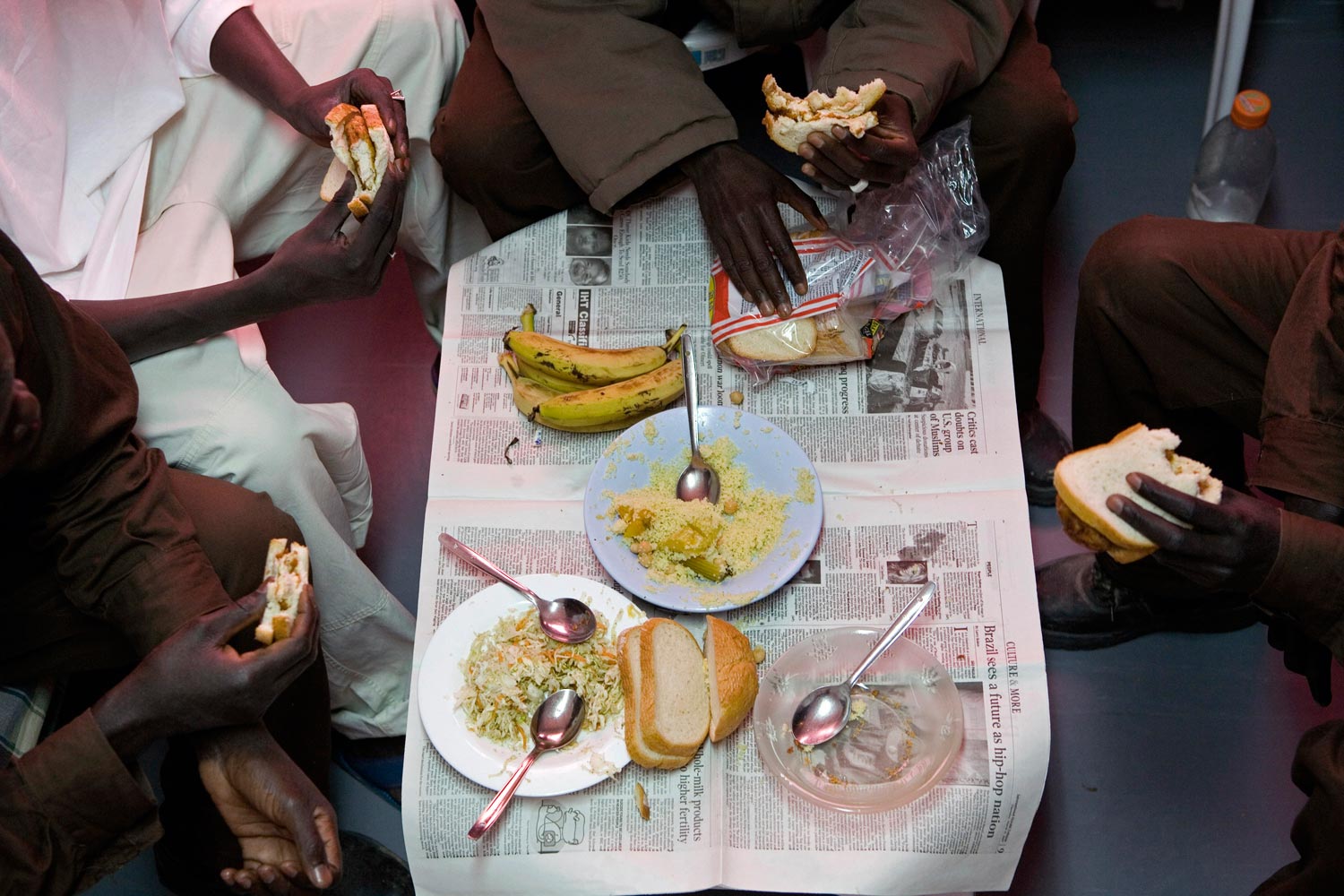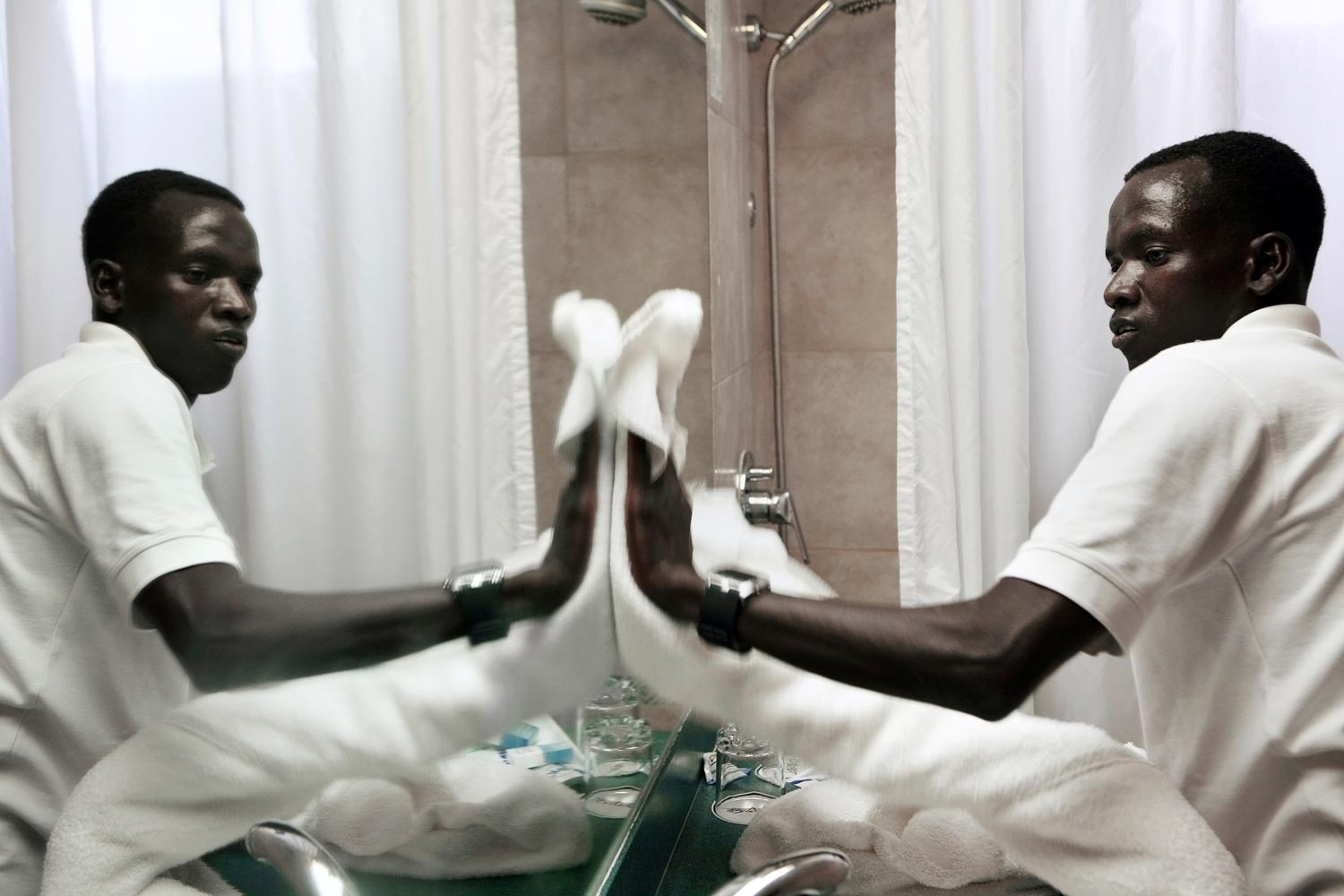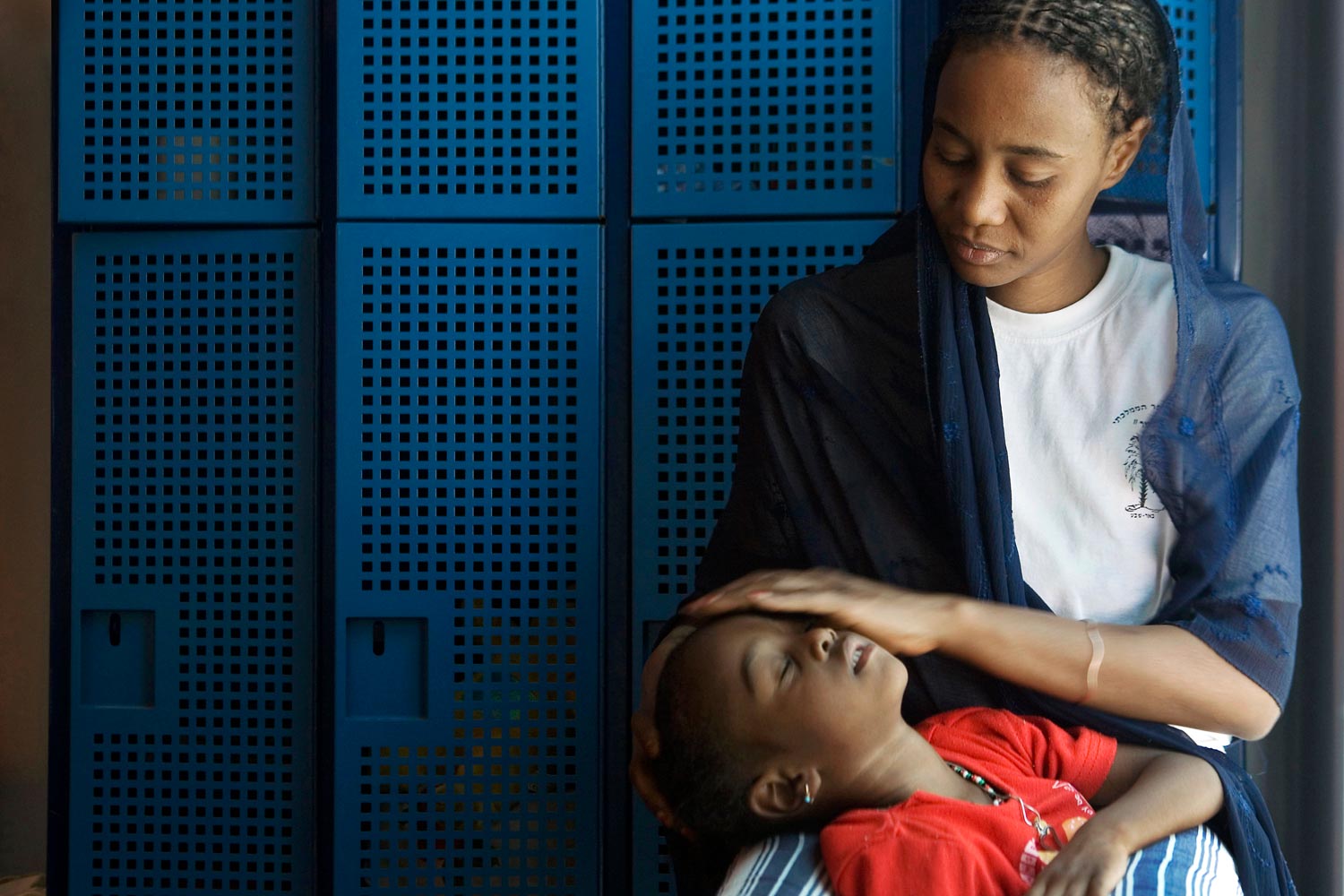A girl's dress hangs on part of the Israeli-Egyptian border fence that was fixed by the Israeli army after two Sudanese families crossed into Israel. The refugees have to overcome the hard journey in the desert, pay hundreds of dollars to Bedouins to lead them towards the border and risk their lives trying to cross the fences evading the Egyptian soldiers who shot them down.
An Eritrean refugee who illegally crossed into Israel rests before being detained by Israeli soldiers. Asylum seekers that succeed in crossing the border fence are captured by military soldiers patrolling the border, who provide them with medical care if needed and bring them in for questioning.
A Sudanese refugee looks at the Israeli flag hanging above the entrance to his cell in Ktziot Prison near the Egyptian border. The first few hundreds of refugees that crossed into Israel were sent to prison without any trial in an attempt to discourage others from following in their path.
An Ivorian asylum seeker puts on his cloths after taking a shower in the deserted kitchen of a once famous karaoke bar in Tel Aviv. More and more refugees crossed into Israel and started arriving at the central urban centers, resulting in the appearance of very basic, over crowded and dirty shelters in abandoned buildings.
An Eritrean refugee walks in a bomb shelter in central Tel Aviv. By March 2008 over 2600 African refugees and illegal immigrants lived in Tel Aviv, most of which from Sudan, Eritrea and the Ivory Coast. Since the authorities provide no solution for the problem, city municipalities opened the bomb shelters allowing refugees to avoid sleeping in the streets.
A Christian postcard hangs on the wall of a shelter in central Tel Aviv. Thousands of African refugees and illegal immigrants live in Tel Aviv, many of which are Christian. All others are Muslim. None are Jewish.
An African asylum seeker eats an orange on his bed placed in the emergency exit of a building functioning as a shelter in central Tel Aviv. The asylum seekers had to find shelter with their little possessions in every possible available place.
A Sudanese girl next to a public faucet in the backyard of a family living in the settlement Kadesh Barnea close to the Egyptian border. A local family provided basic shelter for 50 refugees until they might be allowed to live and work legally in Israel.
Eritrean and Ivorian asylum seekers sit outside a shelter in central Tel Aviv. Not being allowed to work, refugees wonder around with no purpose all day. All hope to receive a visa and/or work permit and be allowed to stay in Israel. The Israeli government ordered a number of times the arrest of refugees and immigrants threatening to send them back to their home countries.
Two Sudanese refugees pick Cherry tomatoes in one of the plantations of Moshav Ein Yahav in south Israel. The refugees that were released from prison to alternative custody were employed as field workers in agricultural settlements earning a humble salary and being provided with basic housing.
Eritrean asylum seekers sleep in Gan Ha’Atzmaut (Independence Garden in Hebrew) next to the Hilton hotel in Tel Aviv. Around 50 Eritreans left the overly crowded shelters and moved into a public garden living of food donations from volunteers.
An Eritrean asylum seeker sleep in Gan Ha’Atzmaut (Independence Garden in Hebrew) next to the Hilton hotel in Tel Aviv. Once the media started covering the living conditions of the refugees in the public garden, the authorities granted them work permits and sent them to various cities around Israel.
A Sudanese refugee reads a book in his cell in ward 15 in Maasiyahu prison near the central city of Ramle. The first few hundreds of men that crossed into Israel were sent to prison, and were locked for months without any charges being placed. The Sudanese refugees in Maasiyahu were placed in the wards of foreign workers planned for deportation.
The shoes stand in the Sudanese refugees’ quarters in Moshav Ein Yahav in southern Israel. Once prisons got over crowded with refugees given the government's policy to detain all the men, the authorities started releasing the refugees to alternative custody in agricultural settlements.
Sudanese refugees gather in their quarters in Moshav Ein Yahav in south Israel. 24 Sudanese refugees (all men) lived in Ein Yahav and worked in the plantations not allowed to leave the settlement.
Sudanese refugees visit the Yad Vashem Jewish holocaust museum in Jerusalem. Thousands of survivors of the genocide in Darfur and the on going civil war in south Sudan have fled to Israel, a country well familiar with atrocities of war. Although Israel was one of two states which pressed for a UN decision in 1950 that every country must accept refugees even if from its enemies, the local authorities have yet to supply a proper solution for the growing number of people seeking shelter.
Sudanese refugees in their cell in Ktizot Prison in south Israel. The initial Israeli government policy was to detain in prison all Sudanese men that crossed into Israel. The refugees in Ktziot Prison had to share their cells with convicted criminals. After a few months (in some cases after more than a year) they would be released to alternative custody.
A Sudanese woman in a domestic violence shelter in the northern village of Osafiya, in which 10 women and their children found refuge. Since all male refugees that crossed into Israel were detained in prison, women and children had to search for help that was provided on a voluntary basis. Only after a few months were the women able to reunite with their husbands once they were released from prison to alternative custody.
A Sudanese mother with her two kids in the refugees’ quarters in Kibbutz Eilot near Eilat. Around 200 refugees lived in the Kibbutz and worked for a local hotels chain.
A Sudanese kid sits among refugees in a temporary camp in the Bedouin settlement Lakiya. Locals have built a temporary camp for a few dozens of refugees that were left in the streets for days, providing them with shelter and food. Spontaneous donations and assistance gave great support to aid organizations and helped many.
Sudanese refugees line up to receive their dinner in their quarters in Kibbutz Eilot near Eilat. Around 200 refugees lived in 2007 in the Kibbutz and worked for a local hotel chain that provided them with housing, meals, and basic supplies on top of a modest salary. Thousands of refugees lived in and around Eilat, one of the largest refugees communities in Israel, working in the local tourism industry.
Sudanese refugees have lunch in their cell in the southern Ktziot Prison. Ktziot was the main prison the refugees were sent to given it’s proximity to the Egyptian border. After the prisons got over crowded, the authorities started releasing refugees to alternative custody solutions in agricultural settlements mainly in south Israel.
A Sudanese refugee cleans the bathroom of a guest room in Hotel Sunrise. Around 200 refugees lived in Kibbutz Eilot near Eilat and worked for a local hotels chain. Over 1000 refugees were granted work permits and employed by the tourism industry in south Israel.
A Sudanese refugee and her daughter in their room in the women and children quarters of the refugee detention camp in Ktziot Prison. The Israeli government built in 2007 a refugees camp within the prison next to the Israeli-Egyptian border with a capacity of over 1000 refugees. The camp’s capacity was reached by the end of the year, forcing the authorities to release some of the refugees. The camp was later enlarged to a capacity of 3000 in 2009, and 10,000 in 2012.

